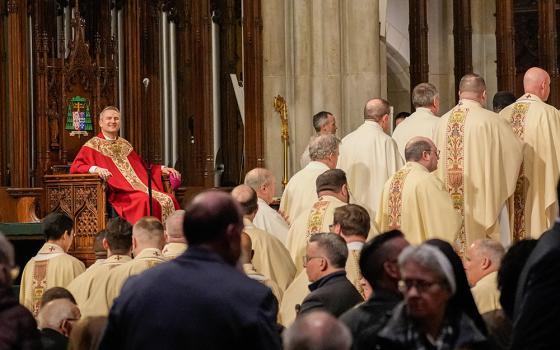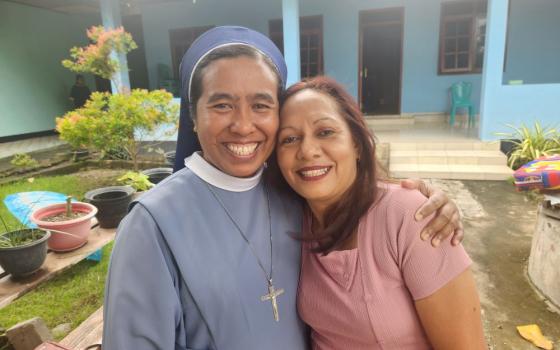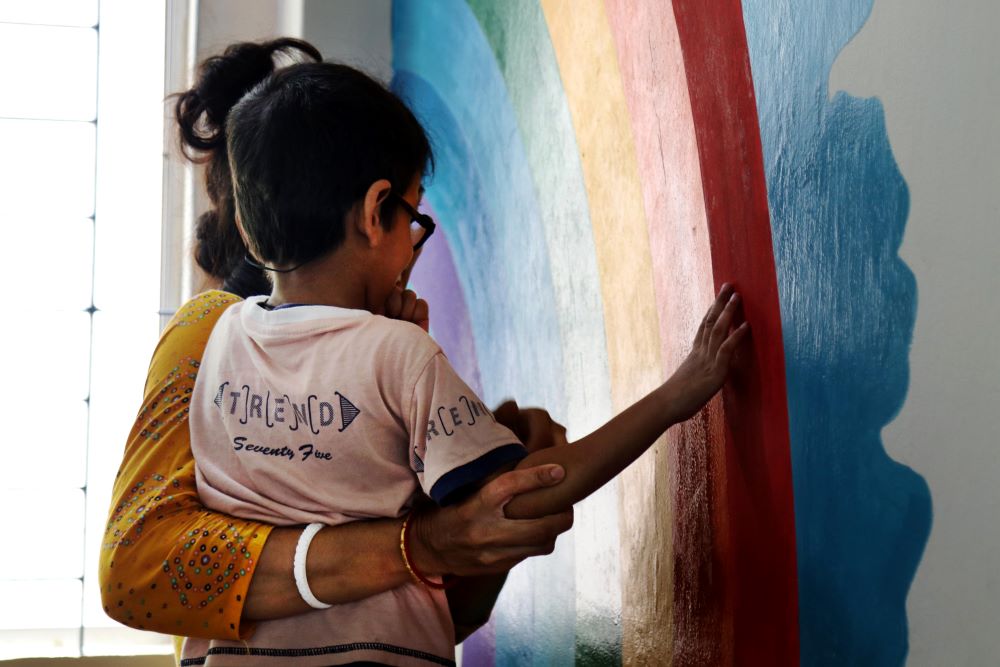
A volunteer teaches a child about the colors of the rainbow at Apon Griha, a center for children with disabilities in Chittagong, Bangladesh. Holy Cross Sisters run the center, started in 2017. (Stephan Uttam Rozario)
In the port city of Chittagong, in Muslim-majority Bangladesh, Holy Cross Sisters are providing education, handicrafts training, physical exercise and other services to children with disabilities.
The center, called "Apon Griha" (Own House), is now bustling with the noise of children from morning to afternoon, growing up with care and love under the watchful eyes of the sisters.
Nusrat Jahan Sadia, 17, was diagnosed with pneumonia five days after birth. She survived the journey to the hospital, but at age 4, she fell from a roof and was seriously injured.
Sadia's mother, Nasrin Begum, 52, told Global Sisters Report that Sadia was sent to a private school for children with disabilities until she was 12. But the high fees and other expenses made it impossible for Sadia to stay there.
"Early in this year, I gave Sadia to this Apon Griha center run by the sisters. Sadia is doing very well here. It is unimaginable that the sisters take care of these children and provide them with breakfast for a small amount of money," Begum said.
"The service that the sisters are providing here is beyond expectations. Where I used to provide services before, I would have bought them with money."
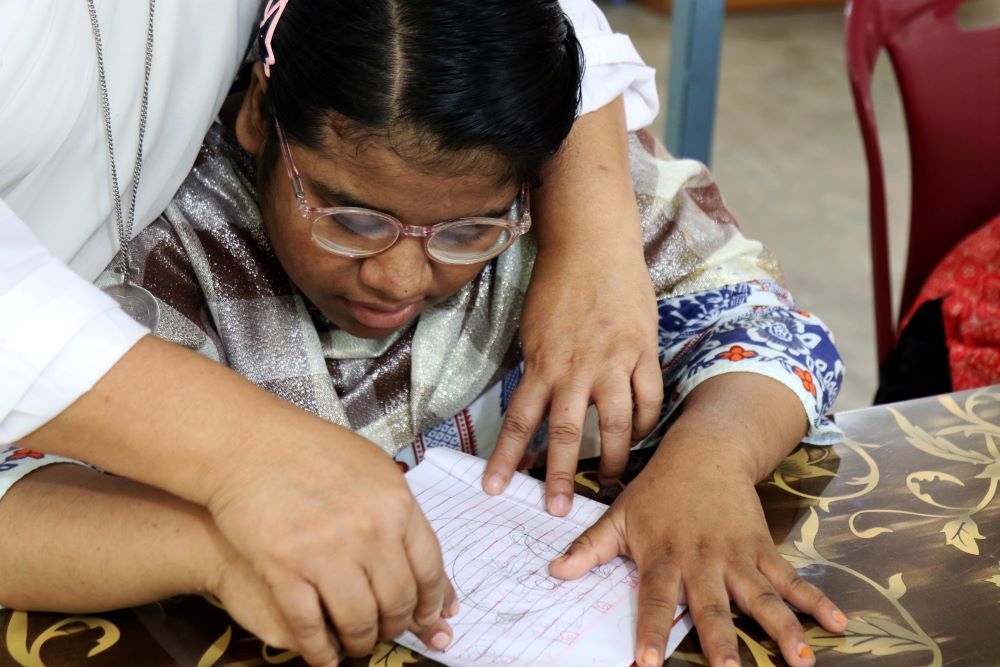
Holy Cross Sr. Nita Rozario teaches each child at the Apon Griha center the alphabet. She and four volunteers work there. (Stephan Uttam Rozario)
Apon Griha is the first and only center for children with disabilities in the Chittagong Archdiocese run by the Holy Cross Sisters. Established in 2017, the center houses 20 boys and girls with physical and mental disabilities, most of whom are Muslim.
Holy Cross Sr. Nita Rozario started the Apon Griha center and still manages it. Four volunteers work with her to look after the children.
Rozario, who holds a nursing degree, was once the convener of the Chittagong Archdiocese health commission and used to organize annual pilgrimages for people with disabilities.
While it was difficult at first to find a location for Apon Griha, the archdiocese provided the current location. Construction is underway on a permanent building with a residential area for the students with disabilities and a place for street children, said Rozario.
Anjumanara Begum, 39, is a homemaker and mother to 12-year-old Sadab, who has a speech impediment.
"Sadab used to talk very little before, but now he is speaking well. The exercises taught at this center are done by Sadab at home, and Sadab's physical condition is improving," Begum said.
Before attending the center, Sadab had behavioral issues at home, but now his family said that things have changed a lot.
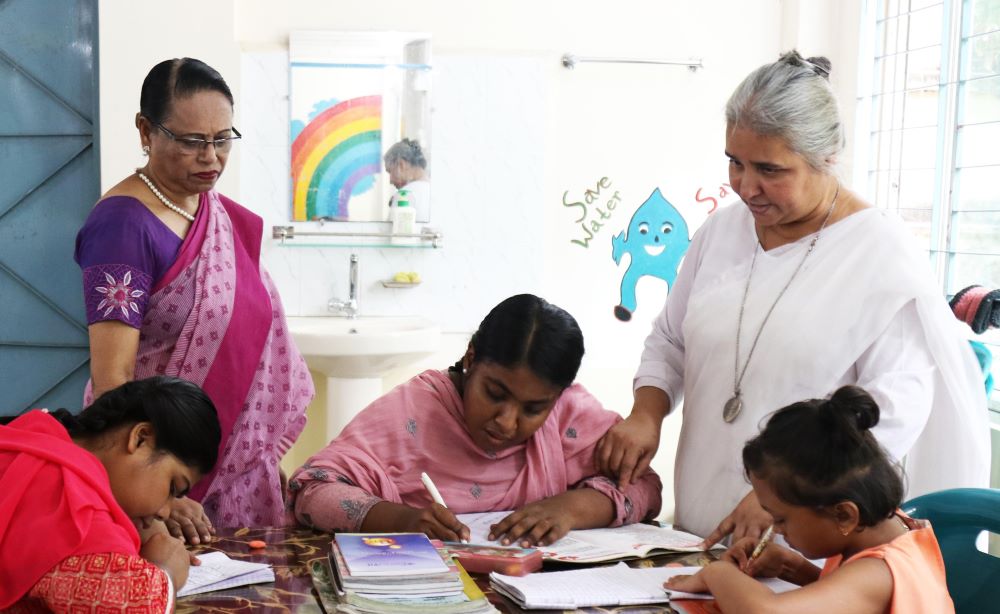
Holy Cross Sr. Nita Rozario, right, supervises the children's education at Apon Griha, a center for children with disabilities in Chittagong, Bangladesh. (Stephan Uttam Rozario)
According to the Bangladesh government, 3.5 million people with disabilities live in the country. The government runs 103 centers to accommodate them.
The Bangladesh Catholic Church directly runs at least five disability centers, but several centers are being managed by Caritas, the Catholic Church's social charity organization.
Rozario said there are not enough centers — public and private — to serve people with disabilities. Apon Griha has been unable to develop adequate facilities because of financial challenges.
"There was a problem of space for our house, but now the biggest problem is the financial crisis," Rozario said. "We cannot afford good physical exercise equipment, good food for the children, and we cannot hire trainers and doctors."
Advertisement
In Bangladesh, societal norms suggest that disabilities are the result of sin or of the family's sins being expressed through the child. As a result, many parents are reluctant to send their children to disability centers because it will become known that their child has a disability.
Rozario said that many parents do not treat such children well and think that their children are a burden. Rozario said that most believe that even with proper care, people with disabilities will be unable to contribute to society.
"We charge 500 taka ($5) per month, but only those who can afford it contribute. Including the expenses of 20 disabled children, the expenses of volunteers and other expenses, we spend about 50,000 taka ($413) every month," Rozario said.
The Holy Cross Sister community and former auxiliary bishop of the Dhaka Archdiocese, Theotonius Gomes, are taking care of the costs,
Nasima Begum said that the services the sisters provide are from the heart and that it is unfortunate that they are unable to buy more equipment due to lack of money. She used to pay 10,000 taka ($83) per month for her daughter Sadia, but at Apon Griha, she pays only 500 taka.
"We are ready to pay more at home if necessary. Even after that, we want this institution to improve. It would be good to have better equipment and a doctor here," Begum said.




